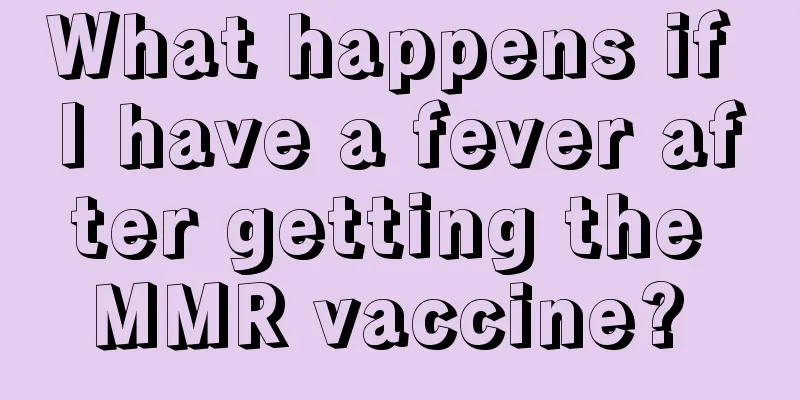What happens if I have a fever after getting the MMR vaccine?

|
Vaccines are highly recommended in modern medicine because they can bring very powerful benefits to the body. They can enhance the body's resistance to certain diseases and make the body immune to diseases. However, vaccines are not omnipotent. Some vaccines may cause side effects to the body. For example, why do you have a fever after getting the measles, mumps and rubella vaccine? Let’s take a look at the explanation below. Measles and mumps are acute respiratory infectious diseases that are easily spread among young people. People with measles and mumps are prone to complications such as pneumonia, laryngitis, myocarditis, encephalitis, orchitis, oophoritis, and pancreatitis. The measles-mumps-rubella vaccine is mainly used for young children. If an endemic epidemic occurs, it can be used by adolescents under the age of 18, but it is not necessary. First of all, the most common adverse reaction is low-grade fever. Parents need to pay close attention to their children's temperature changes and the condition of the vaccination site. Generally speaking, if the body temperature does not exceed a low fever of 38.5℃, and general reactions such as redness, swelling, and nodules at the injection site occur, no treatment is required. Remember not to take any measures at will. Secondly, if you experience a high fever or a large nodule at the vaccination site, seek medical attention promptly and report to the vaccinating doctor. The treatment of reactions caused by different vaccines is not exactly the same. For example, hot compress can be applied to the nodules caused by vaccination with diphtheria, pertussis and tetanus vaccine, but hot compress is strictly prohibited for nodules caused by vaccination with BCG. So if you find any abnormal situation, remember not to deal with it arbitrarily. Vaccines refer to preventive biological products used for human vaccination in order to prevent and control the occurrence and spread of infectious diseases. The fundamental purpose of vaccination is to prevent infectious diseases. Of course, some vaccines may cause adverse reactions in children, such as low fever, rash, crying due to fright, etc., but in most cases, these adverse reactions are normal and transient. Parents must not delay the normal vaccination procedure because of fear. The national immunization program is formulated based on the characteristics of the vaccine, the developmental status of children, and the epidemic patterns of the disease. As long as the child has no contraindications to the corresponding vaccine, it is best to vaccinate the child in a timely manner to reduce the risk of infection. |
<<: Does painless hair removal have any side effects?
>>: What are the side effects of calcium supplementation by infusion
Recommend
How to prevent hamartoma in daily life
Due to the lack of understanding of hamartomas, m...
My fingers itch and there are small hard lumps
It is not uncommon for fingers to itch and have s...
Early rehabilitation exercises for nasopharyngeal carcinoma
The incidence of nasopharyngeal carcinoma is gett...
Hazards of iohexol contrast agent
Iohexol contrast agent is a type of contrast agen...
Will eating apples cause internal heat?
Apple is a very common fruit in our lives. Many p...
How to avoid nursing misunderstandings about testicular cancer
Although testicular cancer is a common phenomenon...
What should lung cancer patients eat? Dietary requirements for lung cancer patients during chemotherapy
Lung cancer is a malignant tumor disease, so it h...
Various eyebrow symptoms reflect physical condition
Cervical spine problems can be reflected through ...
Is the recurrence rate high after unilateral resection of thyroid cancer?
Thyroid cancer is a common endocrine tumor in cli...
White pustules on the chin
It is a common phenomenon for pustules to grow on...
Who are the people susceptible to prostate cancer
In modern society, more and more diseases are bei...
Why is honey and lemon bitter
Honey is a very common thing in people's dail...
After 25 radiotherapy sessions, detailed explanation of cervical cancer staging!
Cervical cancer is one of the major diseases that...
Common early symptoms of colorectal cancer
As the cancer develops, symptoms gradually appear...
How to treat alopecia areata? What should I do if I have alopecia areata?
A very common cause of alopecia areata is mental ...









